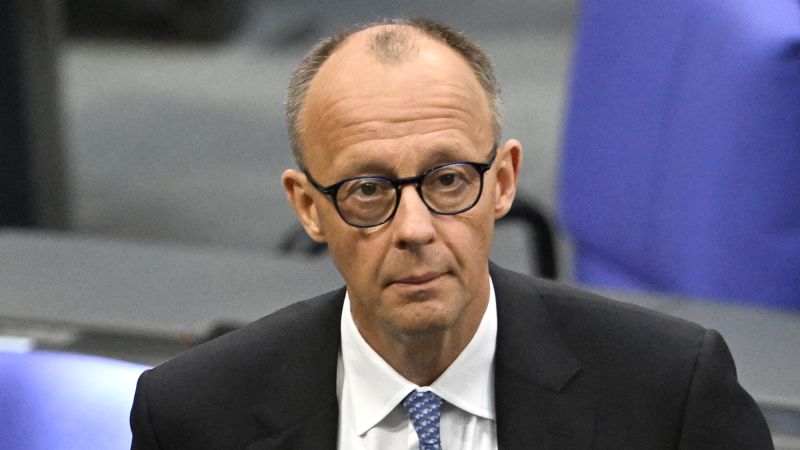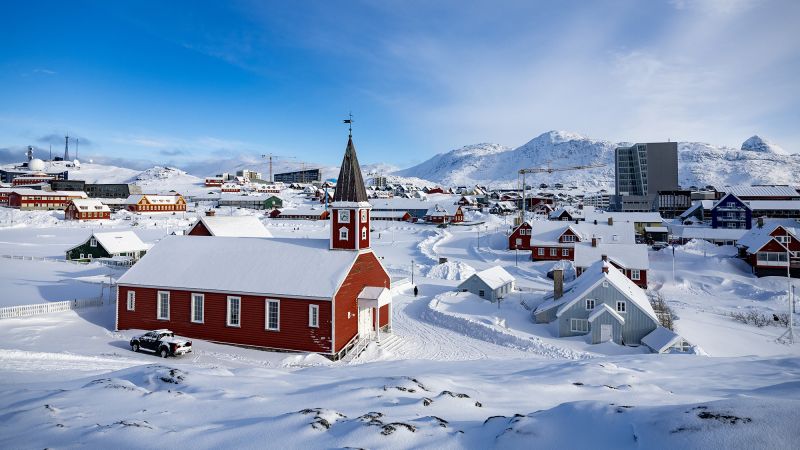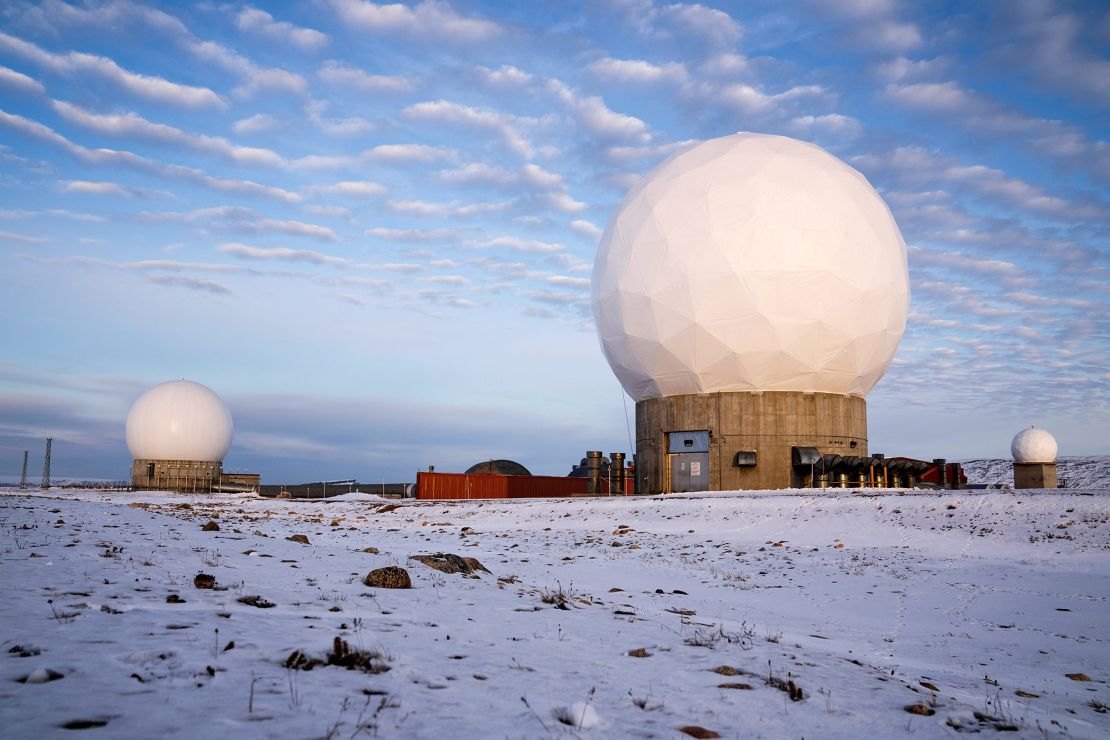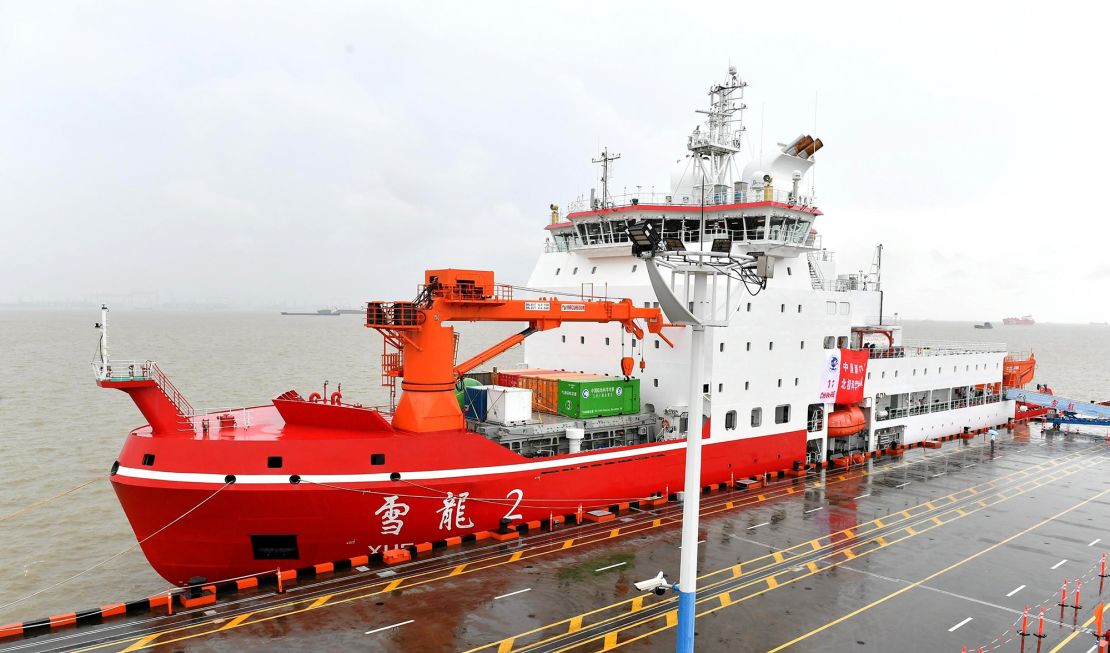Hong Kong
CNN
—
Throughout his second term, US President Donald Trump has trained his focus on a sprawling but sparsely populated island that stretches into the Arctic circle.
The United States needs that island – Greenland, a territory of US ally Denmark – “very badly,” Trump said in an NBC interview that aired on Sunday, echoing comments he’s made repeatedly in recent months.
“Greenland is a very small amount of people, which we’ll take care of, and we’ll cherish them, and all of that. But we need that for international security,” he said, while adding, when asked, that he would not “rule out” taking the island by force.
Trump’s justification? There were Russian and Chinese boats, “gun ships all over the place — aircraft carriers, gun ships — going up and down the coast of Greenland,” he said Sunday. “We need that to be protected.”
Vice President JD Vance laid a similar assessment during a visit to the US’ singular military installation on the island, the Pituffik Space Base, in March.
The base, which lies some 750 miles north of the Arctic Circle, was not well protected from “aggressive incursions” from Russia and China, Vance told troops during an address at that time.
“Denmark has not kept pace in devoting the resources necessary to keep this base, to keep our troops, and, in my view, to keep the people of Greenland safe from a lot of very aggressive incursions from Russia, from China and from other nations,” Vance said – a claim Denmark disputes.
The Trump administration’s interest in Greenland appears to be part of what Washington sees as a broader competition for power in the Arctic, where Russia is a dominant force and China aspires to expand its footprint and capabilities.
But, when it comes to Greenland, experts are puzzled by the administration’s characterization.
Chinese firms, like others, have mounted efforts to develop expensive and geologically challenging mining projects on the resource-rich island. They’ve also bid on constructing airfields there – initiatives observers see as linked to Beijing’s broader aims to enhance its role in the Arctic and gain control of critical minerals.
But those projects have all fizzled, experts say, either due to business reasons or as governments in both Greenland’s capital Nuuk and US NATO partner Copenhagen rebuffed them, at times reportedly under pressure from Washington.
That’s left “almost no Chinese footprint in Greenland,” outside a limited presence in the fishing industry, according to Andreas Østhagen, a senior researcher at the Fridtjof Nansen Institute in Norway, who added: “There is no evidence of any ‘aggressive incursions’ by any actor in Greenland, at least not publicly available.”
And while experts say that there is Russian military activity across regional northern seas and China has scaled up naval activities off Alaska in recent years, in addition to its research and commercial operations in the broader Arctic, there’s been no publicly known signs of Chinese military vessels operating in the waters around Greenland.
Unless the administration provides more details, “I assume that Trump and his advisors are conflating various trends taking place in ‘the Arctic,’ but which in fact take place in specific (other) parts” in and around the Arctic, said Østhagen.
‘Why wouldn’t they be interested in Greenland?’
When a reporter asked JD Vance earlier this year if he had been briefed on specific threats from China and Russia on Greenland and if these were military in nature, Vance said he didn’t “want to get too specific.”
“But we know the Chinese are very, very interested in this island. We have seen some of the economic pressures they have tried to place on Greenland. We know that they are increasingly engaging in military training and military interests certainly. They have started to describe themselves as a ‘near Arctic power’ – part of that is justifying taking a firm interest in Greenland and some of the surrounding territories,” he said, in reference to the “near Arctic state” term that China has used for more than a decade.
“We have seen very strong evidence that both the Chinese and the Russians are interested in Greenland. Why wouldn’t they be interested in Greenland?” he added.
When asked to comment on Trump administration statements, Beijing has said “relations between countries should be handled in accordance with the purposes and principles of the UN.” It’s also defended its adherence to “basic principles of respect, cooperation, win-win result and sustainability in engaging in Arctic affairs.”
Close observers agree that China has looked to ramp up ties and investment in the island since the early 2000s – and has many reasons to be interested.
Greenland is rich in minerals important to the fabrication of military and high-tech goods, and, as Arctic ice melts, sea lanes alongside it are expected to become more important for global shipping.
The island and its adjacent waterways are also strategically important to the US – and its rivals. Washington’s military base plays a critical role detecting missile threats and conducting space surveillance.
Russia, a dominant military force in the Arctic with an expansive Arctic Ocean coastline, is seen by observers and US intelligence as interested in nearby naval routes, which form a key strategic chokepoint stretching from Greenland toward the United Kingdom.
When it comes to China, “I’ve yet to see any coast guard vessels, any naval vessels, let alone aircraft carriers” in waters near Greenland, said Collin Koh, a senior fellow at the S. Rajaratnam School of International Studies in Singapore, noting that Chinese aircraft carriers are “confined to the Pacific Ocean.”
Chinese researchers have written about the island’s potential importance for its own critical mineral supply chains – as well as its strategic significance as an entry point for China to influence Arctic affairs and actualize its “polar silk road” – a vision to extend leader Xi Jinping’s Belt and Road global infrastructure building drive across the top of the world.
Last year, Beijing dispatched its special representative on European Affairs to Greenland for talks on economic cooperation, while Nuuk in 2021 opened a representation office in Beijing – one of only five globally – and sent delegations to the Chinese capital in the past.
But efforts from Chinese firms to gain a physical foothold in Greenland or access its raw materials have been ill-fated.
Chinese companies did become involved in four major mining projects in Greenland, all initiated between 2009 and 2015, but those have either dissolved or stalled, according to experts and research from the Danish Institute for International Studies.
The most well-known of those projects, at a mine in coastal Kvanefjeld, would have allowed a Chinese-funded Australian venture to operate what the company described as a project with the potential to become “the most significant western world producer of critical rare earths.”
The project, however, was blocked in 2021 when the government restricted mining deposits with certain uranium concentrations, citing environmental concerns. The company has launched an arbitration case and expressed hope that a new government elected earlier this year could look more favorably on the project.
But currently, “China has no footprint at all in Greenland mining,” according to Marc Lanteigne, a professor at the University of Tromsø: The Arctic University of Norway, who described China’s footprint on Greenland is “almost negligible” besides “very limited cooperation in seafood trade.”
Lanteigne also noted how the Danish government, under pressure from the United States, stepped in to finance airport refurbishment projects after a Chinese firm was shortlisted as a potential contractor, with the firm withdrawing its bid.
The Danish government in 2016 also blocked a Hong Kong firm’s bid to purchase an abandoned naval facility. Plans in 2017 from the Chinese Academic of Sciences to build a research station also didn’t get government approval, according to researchers.
Denmark has been “quite diligent” in looking to ensure that Greenland’s economic sovereignty is not “transferred to any degree to China,” said Lanteigne. “There has been a great deal of Danish-American cooperation … to monitor Greenland to make sure that there are no overt security threats.”
Meanwhile, a 1951 agreement allows the US to establish American military bases on the island.
That raises the question of why Washington says it needs to take control of Greenland – an expansionist rhetoric that has echoes of the president’s earlier calls to take control of the Panama Canal, over false claims that China “operates” the key waterway.
Greenland has appeared keen to work with US firms on mining projects and the US’ ability to operate its military on the island would be unlikely to change even if Greenland became independent in the future, observers say.
“The reality is that Greenland, as an autonomous territory in the Kingdom of Denmark, has managed its relations to the great powers on its own accord,” said Ties Dams, a research fellow at the Clingendael Institute think tank in the Netherlands.
“If Vance’s comments are indeed a prologue to a military incursion by the US, then the US is the real threat to Greenland’s cherished and longstanding autonomy,” he added.
In response to earlier comments from Trump, Greenland’s Prime Minister Jens-Frederik Nielsen firmly stated that the US “won’t get” Greenland as Trump has previously suggested.
Denmark’s Foreign Minister Lars Løkke Rasmussen has also said Denmark was “open to criticism” by the US but had already “stepped up” investment in Arctic security and remained open to enhanced cooperation with the United States.
The US, meanwhile, some two weeks after Vance’s visit, announced it had removed Pituffik Space Base commander Col. Susannah Meyers. Pentagon spokesperson Sean Parnell said that “actions to undermine the chain of command or to subvert President Trump’s agenda will not be tolerated at the Department of Defense,” in a post on X that linked to a Military.com article, an independent outlet, that said Meyers had sent an email to base staff distancing herself from Vance’s visit.
The Trump administration’s focus on Greenland – and China’s in recent years – come amid increasing focus on the Arctic as an arena for rivalry between the world’s great powers.
China announced its Arctic strategy in a 2018 white paper, where it declared itself “an active participant, builder and contributor in Arctic affairs.”
The document also laid out its aims to explore, conduct research and combat climate change in the Arctic – as well as its ambitions to develop shipping routes and become more involved in fishing and resource extraction, while building its polar silk road.
Today, China has built out its ice breaker fleet, operates research stations in Norway and Iceland, and has partnered with international scientists on a range of projects, in additional to some commercial activities in the non-Russian Arctic.
But growing suspicion in Europe about Beijing’s ambitions in the region – and what experts say is the likely dual military use of its scientific data and research missions – have led to similar instances of cancelled or rejected projects elsewhere in Europe.
“China is in a position now where pretty much its only entry ticket to the Arctic is through Russia,” said Lanteigne from the University of Tromsø.
China has been an important investor in Russian energy extraction and emerged as a dominant presence on increasingly viable shipping lanes along Russia’s Arctic coastline, though at least some of those operations have been affected by Chinese firms not wanting to run afoul of international sanctions on Russia for its war in Ukraine.
Meanwhile, there are other areas of the Arctic where Russia genuinely has been making “somewhat aggressive incursions,” according to Østhagen of the Fridtjof Nansen Institute. That’s particularly in “the European Arctic, where Norway and Finland must manage an increasingly belligerent Russian neighbor,” he said. “But there’s not more Russian activity off the coast of Greenland than elsewhere – in fact, there’s less.”
And China has “scaled up its naval – and eventually also airborne – activity off Alaska in recent years,” he added.
Last year, Russian and Chinese jets were spotted for the first time conducting a joint patrol near Alaska. Months later, Chinese and Russia coastguards also had a first joint patrol in Arctic waters, according to Chinese state media. The two countries have also conducted joint exercises in the Baltic Sea in Europe and the Bering Strait between Russia and Alaska in past years.
But observers say Russia is likely to remain wary of a Chinese security presence in its Arctic region, and Beijing is likely to continue to focus on looking for ways to engage economically, scientifically and diplomatically in the broader region.
That’s especially as Beijing expects the US to try “to push China off that area of the map,” according to Dams of the Clingendael Institute.
China “will resist absolutely, trusting the US strategy of clinging to supremacy will fail on its own accord, if only given time,” he said.



























